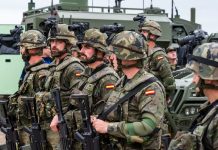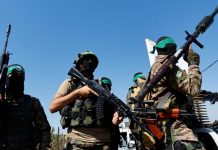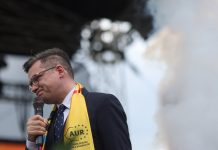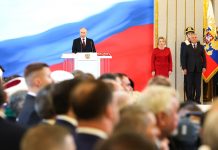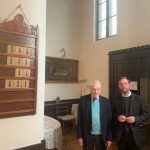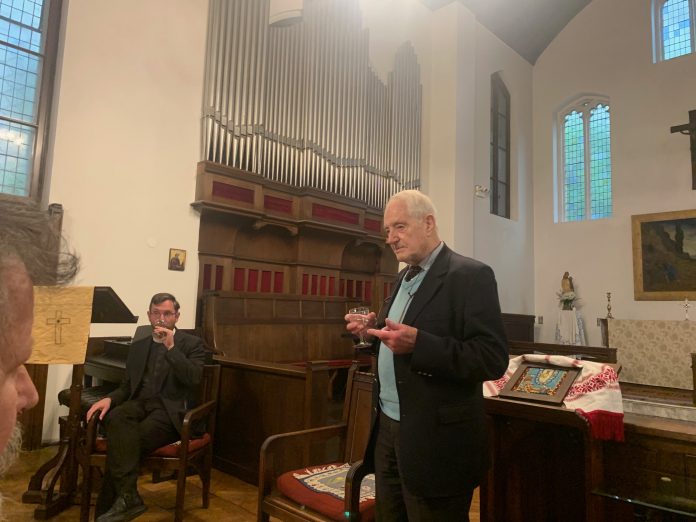
Father Hugh Wybrew speaks impeccable Romanian even though he hasn’t lived in the country for more than 50 years.
The former chaplain of the Anglican Church of Bucharest clearly has a talent for languages and the discipline required to learn them. He studied Russian intensively for 20 months in England in the 1950s, taught by emigres who had left Soviet Russia, some with links to the deposed Czars.
Red-brick church
Arriving in Bucharest in 1971, he took up his post during „the least bad period” of communism (compared to the ‘much worse’ 1950s and early 60s and then 1980s). He was only the fourth British chaplain to serve at the red-brick church next to Icoana Park since World War II.
There was a job opening after the Archbishop of Canterbury Michael Ramsey visited Romania in 1965 leading to a warming in bilateral church relations. The Romanian Orthodox Church then wanted to open a parish in London, and suddenly Bucharest became vacant.
Father Hugh was interested in seeing orthodoxy at home and was advised by the bishop of Gibraltar that there were two options: Athens and Bucharest. His fate was sealed with the words: „Athens has gone, but you can have Bucharest!”
Now aged 90, the Revd. Canon Hugh Wybrew is glad to be back in Bucharest for Orthodox Easter week. It’s a trip down memory lane (he went to Vecernie or Vespers at the Orthodox church this Maundy Thursday) and I imagine a chance to get fresh material for his upcoming memoirs.
Although he retired in 2004, he is keenly active in church life and became Visiting Lecturer in Liturgy at Oxford University’s St. Stephen’s House in 2018.
Fifty-three years ago, he drove into Romania over the Friendship Bridge that crosses the Danube between Ruse and Giurgiu in his white Volkswagen Beetle. This week, he arrived on British Airways and was met by the resident chaplain, Father Nevsky Everett.
Securitate
Back in the day, he was handed some sage advice. ” ‘They’ know who you’re with and what you are talking about at any given time. Now forget about it.”
‘They’ is the anonymous name given to the Securitate, the ubiquitous secret police of Communist leader Nicolae Ceausescu. Its agents were present, tacitly acknowledged– yet also ignored.
Reading his 70-page Securitate file decades later and discovering acquaintances snitched on him seems to have had little impact on the elegant and wise Father Hugh. You get the impression that he rises above such earthly complications.
„People who informed usually had an obligation or a debt,” he explained, whether that was travel to the West or something else. „I will be meeting one of them during this visit and I won’t mention it.”
He is matter-of-fact about the surveillance under the communist regime. „I knew the flat was bugged and the phone was tapped and I never had any problems. Everyone assumed the bugs were in the chandeliers,” he smiled.
Orthodoxy
Speaking to an audience at the Church of the Resurrection on a rainy Thursday evening, he was asked whether the Orthodox Church had collaborated with the communist regime. As a theologian and author of several books about orthodoxy, he has had time to consider this particular conundrum.
„The church didn’t support the regime but it did its best to survive it,” he said. „Either collaborate or be closed,” was the Orthodox church creed.
Orthodoxy is quite different in some ways to Roman Catholicism or Anglicanism. „One of the characteristics of orthodoxy is that it is organized as national churches. To be Romanian is to be orthodox; to be Greek is to be orthodox; to be Russian is to be orthodox,” he explained in an interview.
It’s a paradox for Western minds. „There are more people who claim to be orthodox than to believe in God in Russia,” he told Universul.net. He noted that only 2-3% of Russians regularly go to church, though most Russians consider themselves orthodox.
Communist Romania
„I was not afraid” when I was in Romania he told his audience who wondered what life was like for a Western priest in communist Romania. „I don’t talk politics in my sermons,” he remarked wryly.
Yet the politics of the day physically infiltrated the church. Apart from a few British and American diplomats, there was a smattering of Romanians in the congregation. „They were mainly elderly or infirm, of no interest to the regime, and a few students.”
Every Sunday, a man wearing dark glasses in plain clothes „playing up to the image” would enter the church, check out who was there, and leave.
Impressed by his knowledge of Romanian, his immersion in the Romanian theological college and elegant manners, his Securitate handlers wondered whether ‘Walter’ (his code name) may be of use to them later in Britain– an agent of influence, though ultimately that was never proposed. In the Securitate files, ‘Walter’ is described as ‘a friend of our country.’ A secretary to Patriarch Justinian who started his job in pre-communist Romania is described as ‘hostile to our country’ by the Securitate, though that reflects the politics of the day. „He was loyal, but not a communist,” Father Hugh notes.
„I came to like Romania and Romanians,” he explained. ” ‘They’ interpreted it as I was perfectly happy with the regime which I wasn’t,” he said. „I never spoke critically of the government as there was no point.” It would have been detrimental to his time in Romania too.
„I knew I wasn’t working for British intelligence although ‘they’ assumed I was.”
Iron Curtain
He personally knew Patriarch Justinian the long-serving leader of the Romanian Orthodox Church (had early sympathies with Socialism) who was appointed in 1948 after communism tightened its grip on Romania, until his death in 1977 (which is how he met his non-communist secretary.)
There were Carol services and the Easter Vigil to attend, a busy time for the young Anglican priest behind the Iron Curtain. As well as being the Archbishop of Canterbury’s special envoy to the Romanian patriarch– a position known as an Apocrisiarius– he had congregations in Sofia and Belgrade to tend to and shepherd.
There were dinners with diplomats and regular invitations to the patriarchy to honor and time to deepen his knowledge of Romanian reading ‘Vrăjitorul din Oz” and ” Alice în Ţara Minunilor”, picked up in a Bucharest bookshop. As Romania was a closed communist country, the English priest was one of only a handful of Britons living in the country. There were a few business ventures, however, and he regularly beetled down to Craiova in southern Romania to minister to a group of engineers and their families who worked for Taylor Woodrow, a UK-based civil engineering contractor.
Changes?
I was curious to find out what had changed in the last 50 years. „Bucharest was very quiet; the streets were quiet. There were few private cars. There were quite a few black cars who belonged to officials and members of the party,”he told Universul.net.
There was very little choice when shopping, though food was more plentiful in Bucharest than in villages or smaller towns. He lived near Bucharest’s Bucur Obor market and remembers the displays of seasonal fruit, vegetables and herbs. „Peasants were allowed to sell their wares and keep the profits.”
In churches, Romanian cleric are now moving away from Slavic words in the liturgy. The Latin word ‘marire’ is preferred to ‘slava.’ (glory)
What hasn’t changed, I wondered. Romanians remain outwardly religious more so than in Western Europe. Surprisingly, the churches were heaving with the faithful on Maundy Thursday in the 1970s, just like they are now.
Some attitudes haven’t shifted either. Father Hugh says that after 1989 the Metropolitan of Transylvania referred to the Baptists, to which an estimated 300,000 Romanians belong,” A rent (Ed’s note: a tear) in the seamless robe of the Romanian people.”
Courage
He cherishes small acts of courage and friendship in Romania.
Father George of Barsana, a monastery in the historical region of Maramures, broke with Orthodox protocol and asked Father Hugh to robe up and con-celebrate the Eucharist with him, telling him when to sing, chant and pray.
He talks about a young woman who came to the Anglican church with her teenage daughter every week, defying the Securitate to savor a moment of freedom in communist Romania.
„One day she told me why she came. It was so that for an hour each week she could feel in a free atmosphere. They always left before the beginning of the last hymn and they went across to the Orthodox church. But, she said, we were followed every Sunday just to remind her that ‘they’ knew she was coming to the English church.”
Russian Orthodox Patriarch Kirill I was a KGB spy in Switzerland



